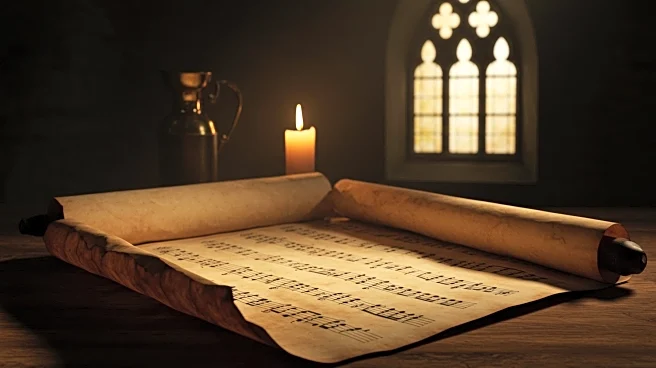What's Happening?
A significant discovery has been made by Professor James Clark, a historian at the University of Exeter, who uncovered rare medieval music from Buckland Abbey. This music, dating back to the early 16th century, survived the dissolution of monasteries under Henry VIII. The music, characterized by its polyphonic style, contrasts with the typical mournful chants associated with monks. The discovery was made while researching the Buckland Abbey for the National Trust, where Clark found leaves of parchment containing chant text and notation in the back of a 15th-century book. This music is now being performed by the university's chapel choir, bringing the sounds of the monks back to life in Devon.
Why It's Important?
The revival of this monastic music offers a unique glimpse into the cultural and religious practices of medieval England. It highlights the resilience of cultural heritage despite historical upheavals like the Tudor state's suppression of Latin worship. This discovery not only enriches historical understanding but also showcases the competitive nature of monasteries in attracting patronage through music. The music's revival could influence current cultural and historical studies, providing insights into the sensory experiences of medieval religious practices. It also underscores the importance of preserving historical artifacts and documents.
What's Next?
The music's performance at Buckland Abbey may lead to further exploration and revival of other lost medieval compositions. It could inspire historians and musicians to delve deeper into the archives for similar discoveries. The British Library's loan of the book to Buckland Abbey allows visitors to view the artifact, potentially increasing interest in historical tourism and educational programs. Future collaborations between historians and musicians might emerge, aiming to reconstruct and perform other historical pieces, thereby expanding the cultural repertoire available to the public.
Beyond the Headlines
This discovery raises questions about the preservation and interpretation of historical music. It challenges modern perceptions of medieval religious practices, emphasizing their complexity and cultural significance. The music's themes, which include calls to an Old Testament God, offer a deeper understanding of the spiritual and existential concerns of the time. This could lead to broader discussions on the role of music in historical religious communities and its impact on contemporary cultural identity.










